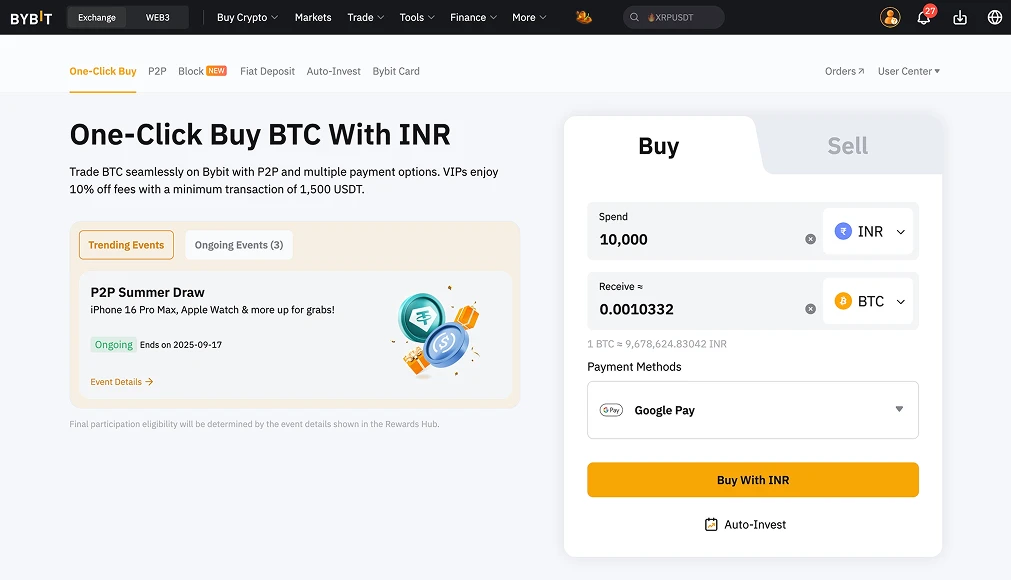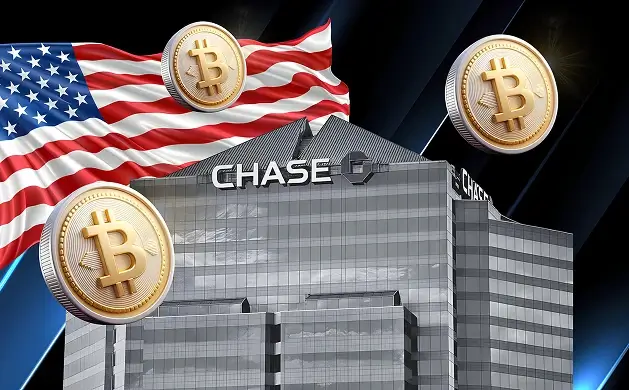How to Buy Crypto with HDFC Bank

Summary: HDFC Bank clients can invest in digital assets by transferring INR to cryptocurrency exchanges that comply with Reserve Bank of India (RBI) guidelines like Bybit or Binance.
By choosing trusted platforms sanctioned by Indian regulators, HDFC Bank users can safely purchase, trade, and store cryptocurrencies while strictly complying with local financial standards.
Bybit is the best platform for HDFC Bank customers due to its robust security, wide range of cryptocurrencies, and seamless integration for INR deposits.
Available Cryptos
2,000+ Cryptocurrencies
Trading Fees
0.1% Spot Trading Fee
INR Deposit Methods
UPI, IMPS, SPEI, Bank Transfers, Cards
Can I Buy Bitcoin with HDFC Bank?
HDFC Bank does not currently provide direct cryptocurrency trading or custody solutions. However, the bank allows customers to transfer Indian Rupees (INR) from their accounts to RBI-regulated crypto exchanges in India.
Although HDFC does not officially partner with any cryptocurrency exchanges, account holders can safely send funds via bank transfers, debit cards, UPI, or digital wallets like PayTM to begin investing in digital currencies.
How to Buy Crypto with HDFC Bank
HDFC Bank customers can transfer Indian Rupees (INR) from their bank accounts to secure cryptocurrency exchanges in India that adhere to Reserve Bank of India (RBI) regulations.
Bybit, a reputable crypto trading platform registered with India's Financial Intelligence Unit (FIU), accepts INR deposits through bank transfers, debit or credit cards, IMPS, UPI, PayTM, Google Pay, and Apple Pay.
Here is a step-by-step guide for HDFC Bank customers to buy crypto on Bybit:
- Sign Up and Verify: Go to Bybit’s website, create an account, and complete identity verification (KYC) in compliance with Indian regulatory requirements.
- Fund Your Account: Navigate to the deposit section, select INR, and transfer funds from your HDFC Bank account using your preferred payment method.
- Choose Your Crypto: Select your desired cryptocurrency from the selection of digital assets.
- Complete the Purchase: Enter the INR amount, confirm the transaction details carefully, and execute your trade securely.

HDFC Bank Cryptocurrency Policy
HDFC Bank does not currently provide direct cryptocurrency trading or storage through its banking platform. However, HDFC Bank customers can transfer funds from their accounts to regulated cryptocurrency exchanges that operate within Reserve Bank of India (RBI) guidelines.
Additionally, HDFC Bank is actively participating in the RBI’s Central Bank Digital Currency (CBDC) pilot program, the Digital Rupee (e₹). Selected customers can use HDFC Bank’s Digital Rupee app to store, send, and receive e₹ tokens, which function like physical cash but in digital form.
Alternative Crypto Exchanges for HDFC Customers
HDFC Bank account holders exploring trusted cryptocurrency exchanges have multiple options available. Each platform facilitates INR deposits, enabling compliant crypto investments:
- Binance: Binance is the world’s largest exchange accepting INR deposits through HDFC Bank transfers, UPI, IMPS, and popular digital wallets. Traders can access more than 350 cryptocurrencies, with fees generally starting around 0.1%.
- OKX: OKX offers easy INR deposit options via local payment channels. The platform prioritizes security, offering an intuitive interface and listing over 300 crypto assets. Trading fees are competitively priced between 0.08% and 0.1%.
- KuCoin: KuCoin enables HDFC Bank customers to deposit INR through bank transfers, UPI, and mobile payment apps. Known for its extensive crypto selection of 700 assets, it maintains straightforward fee structures starting at 0.1% per trade.
When choosing an exchange, HDFC Bank customers should consider the convenience of INR deposits, the availability of cryptocurrencies, trading fees, and overall security standards.
About HDFC Bank
HDFC Bank, established in 1994 and headquartered in Mumbai, is India's largest private sector bank by assets and market capitalization. Following its 2023 merger with Housing Development Finance Corporation (HDFC Ltd.), the bank has expanded its reach, serving over 120 million customers through a network of more than 8,000 branches across 3,800 cities and towns.
Under the leadership of CEO Sashidhar Jagdishan and Chairman Atanu Chakraborty, HDFC Bank offers a comprehensive suite of services, including retail and wholesale banking, treasury operations, and digital banking solutions like NetBanking and PayZapp.
.webp)
Final Thoughts
Although HDFC Bank doesn't directly offer crypto trading services, customers have clear, compliant pathways to invest in digital assets through regulated exchanges like Bybit, Binance, OKX, and KuCoin.
Before initiating transfers, users should verify payment methods, fees, asset availability, and security measures to ensure alignment with their financial goals.
Frequently asked questions
Is investing in cryptocurrency legal in India?
Yes, investing in cryptocurrencies is legal in India. However, the Reserve Bank of India (RBI) and government authorities regulate cryptocurrency exchanges, ensuring strict compliance with Anti-Money Laundering (AML) and Know Your Customer (KYC) guidelines.
Does HDFC Bank impose additional fees on INR transfers to crypto exchanges?
HDFC Bank does not charge any special or additional fees specifically for transfers to cryptocurrency exchanges. However, standard transaction fees for bank transfers or other payment methods such as UPI or debit cards may still apply.
Can I use HDFC Bank credit or debit cards to buy cryptocurrency?
No, HDFC Bank has restricted the use of its credit, debit, and prepaid cards for purchasing or trading cryptocurrencies. Customers should utilize alternative methods like bank transfers, UPI, or digital wallets to fund accounts on compliant crypto exchanges.
Is the Digital Rupee (e₹) issued by HDFC Bank considered a cryptocurrency?
No, the Digital Rupee (e₹) is a Central Bank Digital Currency (CBDC) issued by the RBI, representing a digital form of legal tender. Unlike decentralized cryptocurrencies, the e₹ is centralized and regulated, functioning similarly to physical cash in digital transactions.
%2520(1).webp)
Written by
Tony Kreng
Lead Editor
Tony Kreng, who holds an MBA in Business & Finance, brings over a decade of experience as a financial analyst. At Datawallet, he serves as the lead content editor and fact-checker, dedicated to maintaining the accuracy and trustworthiness of our insights.

.webp)
%2520(1).webp)

.webp)
.webp)




